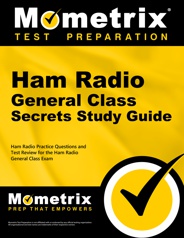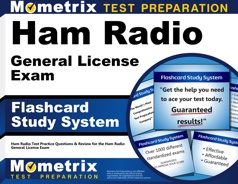The Federal Communications Commission (FCC) provides a General Class exam to certify the operation of an amateur station. This page covers the General Class radio license needed to operate an amateur radio, also called ham radio. Three levels of ham radio licenses are issued by the FCC, and the general license is intended for those who have already taken the Technician Class exam.
Click “Start Test” above to take a free Ham Radio General Class practice test!
Ham Radio General Class Exam Eligibility
Meeting the eligibility requirements for this exam is relatively easy. To take the test, you need a valid US mailing address, valid proof of identification, and a social security number. You must also have taken and passed the Technician Class exam.
Ham Radio General Class Exam Outline
The Ham Radio General Class exam contains 35 multiple-choice questions, which are split into ten main categories.
1. Commission’s Rules (5 questions)
The five questions in this category are pulled from a pool of 57 questions. The pool of questions is split into five groups:
Group A
- Frequency privileges
- Primary and secondary allocations
Group B
- Antenna structure limitations
- Retransmitting radio signals
- Beacon operation
- Good engineering
- Good amateur practice
- Prohibited transmissions
Group C
- Data emission standards
- Transmitter power regulations
- 60-meter operation requirements
Group D
- Element credit
- Volunteer examiners
- Volunteer examiner coordinators
- Remote operation
- Temporary identification
Group E
- ITU regions
- Control categories
- Third-party rules
- Automatically controlled digital station
- Repeater regulations
2. Operating Procedures (5 questions)
The five questions in this category are pulled from a pool of 60 questions. The pool of questions is split into five groups:
Group A
- Breaking into a contact
- Answering DX stations
- Phone operation procedures
- Transmitter setup for voice operation
- LSB/USB conventions
Group B
- RACES operation
- Band plans
- Operating effectively
- Drills and emergencies
Group C
- Q signals
- CW operating procedures
- CW procedural signals
- Full break-in
Group D
- HF operations
- Volunteer Monitor Program
Group E
- Digital mode operating procedures
3. Radio Wave Propagation (3 questions)
The five questions in this category are pulled from a pool of 37 questions. The pool of questions is split into three groups:
Group A
- Geomagnetic field and stability indices
- Sunspots
- Solar radiation
Group B
- Short path and long path propagation
- Maximum and minimum usable frequencies
- Ionospheric refraction
- Determining propagation conditions
Group C
- HF scatter
- Ionospheric regions
- Near vertical incidence skywave
- Critical angle and frequency
4. Amateur Radio Practices (5 questions)
The five questions in this category are pulled from a pool of 60 questions. The pool of questions is split into five groups:
Group A
- Station configuration and operation
Group B
- Tests
- Test equipment
Group C
- Grounding
- Bonding
- Interference to consumer electronics
Group D
- S meters
- Speech processors
- Sideband operation near band edges
Group E
- Alternative energy source operation
- Mobile and portable HF stations
5. Electrical Principles (3 questions)
The five questions in this category are pulled from a pool of 40 questions. The pool of questions is split into three groups:
Group A
- Impedance
- Reactance
- Resonance
- Inductance
- Impedance transformation
- Capacitance
Group B
- Electrical power calculations
- PEP calculations
- Decibels
- Sine wave root-mean-square values
- Current and voltage dividers
Group C
- Transformers
- Resistors, inductors, and capacitors in series and parallel
6. Circuit Components (2 questions)
The five questions in this category are pulled from a pool of 24 questions. The pool of questions is split into two groups:
Group A
- Solid-state diodes and transistors
- Batteries
- Resistors
- Rectifiers
- Vacuum tubes
- Capacitors
- Inductors
Group B
- Microwave ICs
- RF connectors
- Analog and digital integrated circuits
- Ferrite cores
- Display devices
7. Practical Circuits (3 questions)
The five questions in this category are pulled from a pool of 38 questions. The pool of questions is split into three groups:
Group A
- Schematic symbols
- Power supplies
Group B
- Amplifiers
- Oscillators
- Digital circuits
Group C
- Filters
- Digital signal processing
- Transceiver design
8. Signals and Emissions (3 questions)
The five questions in this category are pulled from a pool of 43 questions. The pool of questions is split into three groups:
Group A
- AM, FM, and single sideband
- Link budgets
- Link margins
- Modulation envelope
- Overmodulation
- Digital modulation
Group B
- Deviation
- Bandwidths of various modes
- Frequency changing
- Intermodulation
Group C
- Digital emission modes
9. Antennas and Feed Lines (4 questions)
The five questions in this category are pulled from a pool of 46 questions. The pool of questions is split into four groups:
Group A
- Characteristic impedance and attenuation
- Antenna feed point matching
- Standing wave ratio calculation, measurement, and effects
Group B
- Basic dipole and monopole antennas
Group C
- Directional antennas
Group D
- Specialized antenna types and applications
10. Electrical and RF safety (2 questions)
The five questions in this category are pulled from a pool of 25 questions. The pool of questions is split into two groups:
Group A
- Routine station evaluation
- RF safety principles, guidelines, and rules
Group B
- Antenna and tower safety
- Electrical shock
- Fusing
- Grounding
- Interlocks
- Wiring
Check Out Ham Radio General Class Study Guide
Get practice questions, video tutorials, and detailed study lessons
Get Your Study Guide
Registration
You can register for the exam online at the Universal Licensing System page of the Federal Communications Commission website.
How to Study
Think you aren’t a good test-taker? Maybe on a study-time crunch? Or just don’t know how to begin studying? Mometrix has designed a new Study Secrets course to help every student, no matter what study scenario you are in. Here’s what you’ll find in the Study Secrets Course:
- Techniques to Conquer Procrastination
- Steps to building a Study Plan custom to your learning style
- 7 Effective Note-Taking Methods
- Test-Taking Tips
- Memory Techniques and Mnemonics
- And much more!
Everyone learns differently, so we’ve tailored our Study Secrets Course to ensure every learner has what they need to prepare for their upcoming exam or semester. Click below to check it out!
Test Day
The General Class exam is offered by volunteers who work with a Volunteer Exam Coordinate under the direction of the FCC.
You will need to bring a few things with you on the day of the exam:
- FCC Registration Number
- A valid photo ID, such as your driver’s license or passport
- A valid email address
- Two number-two pencils with erasers
- An ink pen
- A calculator that has the memory erased and no formulas saved on it
- A check or money order to pay your registration fees
Passing Score
To pass the Ham Radio General Class exam, you must answer 26 out of 35 questions correctly, which is a score of 74%.
You will receive your scores as soon as you finish taking the exam. If you pass, you will be eligible to take the Extra Class test on the same day, which is optional.
Retaking the Test
You are allowed to retake the General Class exam if you did not pass the first time. You will have to pay the exam fee to take it again, but you may retake it as many times as you wish and can even take it again on the same day as your first take.
For retakes of the exam, the large pool of questions is utilized in order to create a completely new version of the exam each time you take it.
Check Out Mometrix's Ham Radio General License Flashcards
Get complex subjects broken down into easily understandable concepts
Get Your Flashcards
FAQs
Q
How many questions are on the Ham Radio General Class exam?
A
There are 35 multiple-choice questions on the exam.
Q
How long is the Ham Radio General Class exam?
A
There is no set time limit, but the exam generally takes anywhere from 15 to 45 minutes.
Q
What is the passing score for the Ham Radio General Class exam?
A
To pass the exam, you must achieve a score of at least 74%, which means answering at least 26 questions correctly.
Q
How much does the Ham Radio General Class exam cost?
A
The examination fee is $15.


